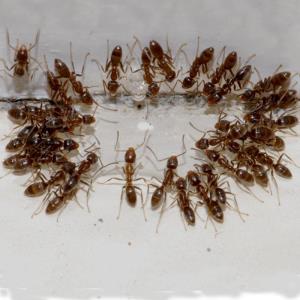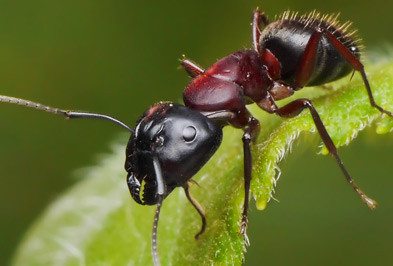Total Ant Control: Methods and Services to Defeat Ant Issues
Total Ant Control: Methods and Services to Defeat Ant Issues
Blog Article
Environmental Influence of Bug Control: Balancing Effectiveness With Sustainability
The ecological effect of pest control is an important concern that requires a delicate balance between accomplishing performance in making certain and managing parasites sustainability of our ecological communities. As we aim to secure our plants, homes, and wellness from the dangers postured by bugs, the approaches we use can inadvertently harm the atmosphere. From making use of hazardous chemicals that seep into our soil and water to the unexpected consequences on non-target types, the effects of standard pest control methods are significant. There are emerging approaches that offer hope for a more lasting strategy to pest monitoring. These solutions not just purpose to attend to the immediate insect troubles but also think about the long-lasting wellness of our planet.
Unsafe Chemicals in Insect Control
The utilization of damaging chemicals in parasite control poses considerable environmental and health risks that require cautious factor to consider and reduction techniques. Herbicides, pesticides, and insecticides are typically made use of to eradicate bugs, yet their widespread application can bring about unexpected consequences. These chemicals can infect dirt, water sources, and the air, affecting not just the targeted bugs however likewise useful pests, wildlife, and humans.

To address these risks, integrated parasite management (IPM) methods are being advertised as a more lasting alternative. IPM involves a mix of methods such as organic control, habitat adjustment, and the targeted use of pesticides as a last option (ant control mathews nc). By adopting an alternative approach to pest control, we can decrease the ecological and wellness influences linked with unsafe chemicals while successfully taking care of pest populations
Impact on Non-Target Variety
Taking into consideration the unintentional consequences of bug control approaches, the influence on non-target species is a vital element that needs extensive analysis. While insect control steps intend to target certain parasites, other microorganisms in the ecological community might be inadvertently impacted. Non-target species, consisting of useful pests, birds, animals, and also plants, can suffer indirect or straight injury from pesticide applications or organic control methods.
Insecticides made to deal with a certain bug parasite might damage pollinators like or all-natural predators such as ladybugs. Biological control agents, if not species-specific, can posture dangers to unintended targets, interrupting the environmental equilibrium.
To minimize the influence on non-target varieties, integrated parasite management (IPM) methods that stress an all natural strategy to pest control are suggested. These approaches prioritize making use of eco-friendly methods, reducing damage to advantageous microorganisms while properly taking care of pest populaces. Conducting extensive threat evaluations and checking the outcomes of pest control initiatives are vital steps in protecting non-target types and promoting general ecological community wellness.
Soil and Water Contamination
Unintended ecological consequences of insect control techniques prolong beyond affecting non-target types, with substantial ramifications for soil and water contamination. Chemicals, herbicides, and chemical fertilizers utilized in parasite control can seep into the soil and contaminate groundwater, posturing a danger to both terrestrial and water environments. Soil contamination can interrupt the equilibrium of bacteria necessary for vitamins and mineral biking and plant development, leading to decreased dirt fertility and efficiency. Additionally, these chemicals can persist in the environment for extended durations, accumulating in the dirt and potentially entering the food web.
Water contamination is another important concern related to bug control methods. Drainage from farming areas treated with chemicals can bring these chemicals into neighboring water bodies, impacting aquatic microorganisms and water high quality. Contaminants in water resources can have significant repercussions, influencing not just marine life yet also human health and wellness through the intake of infected water or marine microorganisms. To minimize soil and water contamination from insect control activities, integrated insect monitoring methods that prioritize sustainability and minimize chemical inputs are essential.
Air Pollution From Pesticide Use
Exposure to air-borne pesticides throughout farming applications postures a substantial issue for air pollution control measures. Additionally, pesticide drift, where pesticides are lugged by the wind to unintentional areas, can lead to the contamination of neighboring environments and water bodies.

Methods for Sustainable Parasite Control
In the realm of farming techniques, carrying out sustainable bug control approaches is paramount for preserving eco-friendly balance and protecting plant returns. Lasting insect control emphasizes making use of eco-friendly methods to manage bug populations successfully while decreasing injury to non-target organisms and communities. Integrated Pest Monitoring (IPM) is an extensively adopted approach that incorporates organic, cultural, physical, and chemical control approaches to achieve lasting pest monitoring services.
One key strategy in sustainable pest control is advertising biodiversity within agroecosystems. By improving natural adversaries of insects, such as parasitoids and killers, farmers can lower the need for synthetic pesticides. Crop turning and diversification are also efficient strategies to interfere with pest life process and develop less desirable problems for insects to thrive. Furthermore, using pest-resistant plant varieties and using methods like trap cropping can help in reducing pest pressure without depending greatly on chemical treatments. Ultimately, by integrating these lasting bug control methods, farmers can achieve a balance in between pest monitoring performance and environmental stewardship.
Final Thought
To conclude, the environmental impact of insect control approaches must be meticulously considered to stabilize efficiency with sustainability. Dangerous chemicals made use of in parasite control can lead to soil and water contamination, air pollution, and harm non-target species - termite control. It is important to execute lasting parasite control methods to minimize these unfavorable effects on the setting and promote a much healthier ecosystem for future generations
By embracing an alternative approach to pest control, we can lessen the ecological and health and wellness effects connected with damaging chemicals while efficiently managing pest populations.

To alleviate the air pollution caused by chemical use, it is important to embrace incorporated pest monitoring approaches that prioritize the use of non-chemical parasite control approaches, such as crop rotation, all-natural killers, and immune plant ranges. Lasting insect control stresses the use of environmentally pleasant methods to handle insect populations properly while lessening injury to non-target microorganisms and environments. Integrated Insect Administration (IPM) is an extensively adopted approach that integrates organic, social, physical, and chemical control methods to accomplish lasting parasite management options.
Report this page